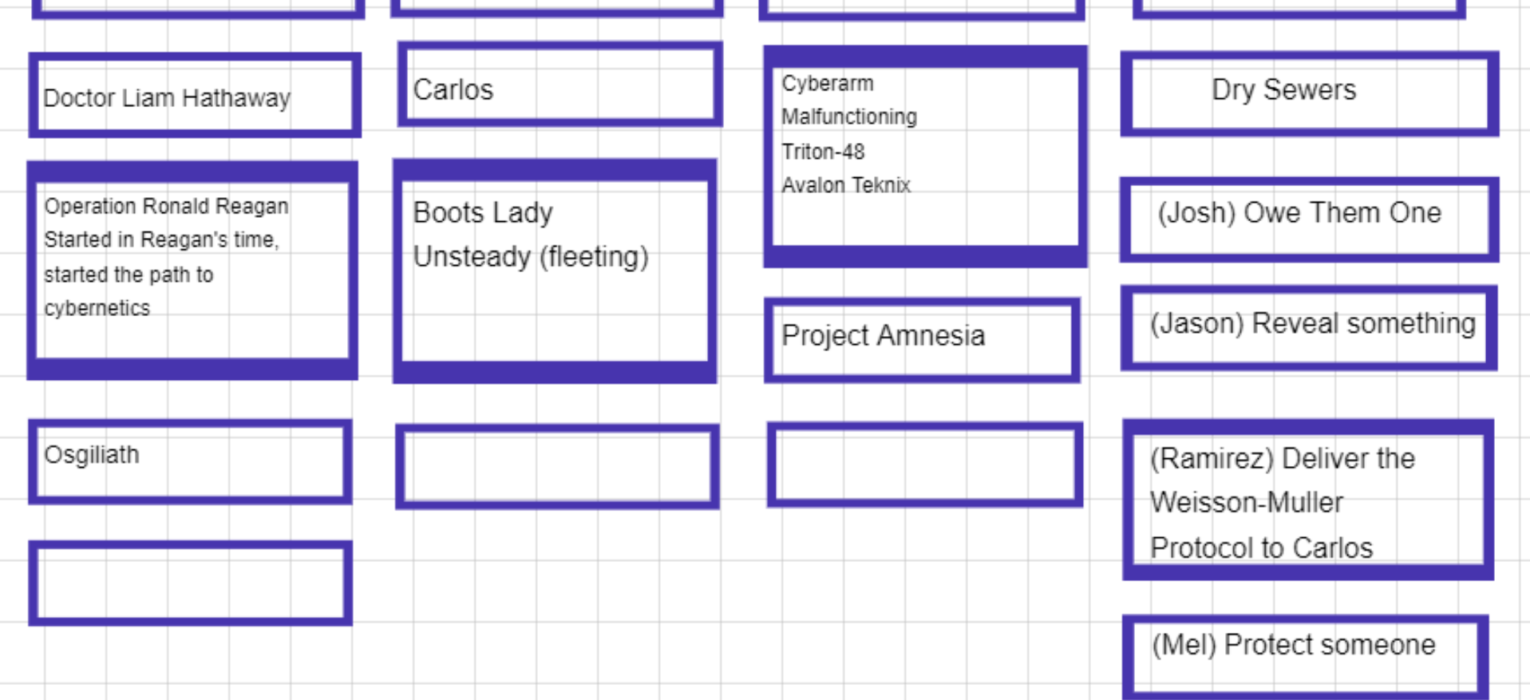I’ve been running a limited series game the last month or so. Initially I had planned to use the Technoir system in its vanilla incarnation just to try out the verb-adjective mechanic, but, as usual, I couldn’t help but muck about with it a bit more deeply by the time we got to the table.
I’m a huge fan of the narrative dice originally introduced in Fantasy Flight‘s Star Wars game and now incorporated into their generic Genesys system. I love having a single roll that fully represents the outcome, for one thing, and I love the way the dice combine mechanical and narrative outcomes into a single set of results.
My theory was that Technoir’s narrative-heavy system would be a natural fit with Genesys dice, and I’m happy to report that that has worked out pretty nicely. In general, I’ve gone with the rule that successes allow the original action to succeed, and boosts allow an action against another part of the local environment or a bit of information related to the current investigation.
Technoir’s dice mechanics are more particular about successes and opposition, and I imagine some folks like that specificity, so this combination won’t be everyone’s cup of tea. But for me, it’s beautiful.
An example from the other night’s session:
DM: Ok, M, it’s your turn. There are guys outside the door to the hallway, and others coming up the stairs. The sentry robot is mostly disabled. What do you do?
M: I’m going to finish off the robot.
M rolls 3 (green) Shoot dice and 2 (blue) Boost dice versus the robot’s 2 (black) Setback dice. She gets no successes, but 3 boosts.
DM: You don’t manage to hit anything vital on the robot, but the shot careens off of its body and hits some other important part in the building. What is it?
The players have a brief discussion about possible alternatives.
M: The bullet ricochets into the locking mechanism for the door at the end of the hallway, breaking the lock
DM: Ok, the lock now has the sticky adjective stuck. The guy outside the door quickly realizes what’s happened and begins slamming his fist into the glass…
This is my favourite part of roleplaying games – the strategic situation transforms instantly, and the players and DM have to adjust on the fly to imagine what might come next in these new circumstances. The verb-adjective system of Technoir makes it incredibly easy to make small changes to every element of the scene, and the Genesys dice add the possibility of interesting side effects to every roll.
Something else that we arrived at as a group was the idea of opening questions. Technoir uses a collection of note cards as a “story map” that keeps the important bits of information about the game in view of the entire group. At the beginning of the first session, I provided a couple of notes as a seed to this map, but I also asked each player to add a name to that collection. The second session, the players didn’t contribute new elements, and at the end of that session they noted that they really liked doing so, so the other night we did it again, this time adding a promise made by each character.
Given this was always a limited series game, we won’t get to see this system reach its fullest expression, but I’ve been really happy with how the game has worked out. The players have been able to explore their characters – who started play with blank sheets – and have been able to guide the story more than usual, while I have been able to watch what they’re actually doing with their characters and provide matching suggestions to flesh out those characters as we discover what the blank sheets actually represent.
Next session will be our last, and our story map right now looks like this:

Looking at it right now, I see that I haven’t really done the best job keeping track of which elements belong to which columns, but I also realize that it doesn’t matter – these elements are doing their jobs, giving us touch points from which we can jump off into a new direction, and the map itself gives us a place to put notes that feel significant.
It’s hard to know if an idea like this will work, but I have to say, this one is working better than I imagined, and I’d love to offer it up for others to test out. Narrative games as a collective allow players and DM to share the load of creating a story much more evenly, and it’s great when the mechanics support that distribution this well.
I’d love to hear about your experiments with game systems. What’s worked? What’s needed work? What have players come up with that surprised you?

